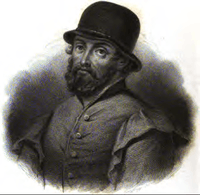Lope de Rueda

Lope de Rueda (c.1510–1565) was a Spanish dramatist and author, regarded by some as the best of his era. A very versatile writer, he also wrote comedies, farces, and pasos. He was the precursor to what is considered the golden age of Spanish literature.
Life
He was born early in the sixteenth century in Seville, where, according to Cervantes, he worked as a metal-beater. His name first occurs in 1554 as acting at Benavente, and between 1558 and 1561 he was manager of a strolling company which visited Segovia, Seville, Toledo, Madrid, Valencia and Córdoba. In Córdoba, de Rueda fell ill, and on 21 March 1565 made a will which he was too exhausted to sign; he probably died shortly afterwards, and is said by Cervantes to have been buried in Córdoba cathedral. He was twice married; first to actress, singer and dancer, Mariana, who had spent six years as a performer in service to the frail and inferm Don Gaston, Duke de Medinaceli, an avowed friar and cleric,whose estate was the subject of a lawsuit filed by Lope de Rueda on his wife's behalf laying claim to six years of back wages. de Rueda's second marriage was to Rafaela Angela, a Valenciana and woman of property, who bore him a daughter.
Works
His works were issued posthumously in 1567 by Timoneda, who toned down certain passages in the texts. de Rueda's more ambitious plays are mostly adapted from the Italian; in Eufemia he draws on Boccaccio, in Med ora he utilizes Giancarli's Zingara, in Arinelina he combines Raineri's Attilia with Cecchi's Servigiale, and in Los Engañados he uses Glingannati, a comedy produced by the Intronati, a literary society at Siena. These follow the original so closely that they give no idea of de Rueda's talent; but in his pasos or prose interludes he displays an abundance of riotous humour, great knowledge of low life, and a most happy gift of dialogue.
His predecessors mostly wrote for courtly audiences or for the study; de Rueda with his strollers created a taste for the drama which he was able to gratify, and he is admitted both by Cervantes and Lope de Vega to be the true founder of the national theatre.
His works have been reprinted by the marqués de Fuensanta del Valle in the Colección de libros raros curiosos, vols. xxiii. and xxiv.
Modern adaptation Nineteen of the 26 pasos were translated into English between 1980 and 1990 by Joan Bucks Hansen, and staged by Steve Hansen and the St. George Street Players of St. Augustine,FL where they were performed nightly for five years in the city's restored Spanish Quarter; and they presented seven of the translations in 1984 at the Ninth Siglo de Oro Festival at Chamizal.[1]
Notes
References
 This article incorporates text from a publication now in the public domain: Chisholm, Hugh, ed. (1911). "Rueda, Lope de". Encyclopædia Britannica (11th ed.). Cambridge University Press.
This article incorporates text from a publication now in the public domain: Chisholm, Hugh, ed. (1911). "Rueda, Lope de". Encyclopædia Britannica (11th ed.). Cambridge University Press.